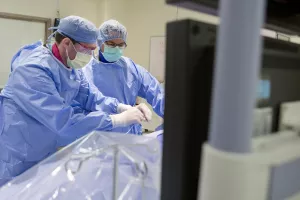When your heart needs repair, we’re here to get it back on beat with expert cardiac (heart) surgery. Our skilled cardiac surgeons use the newest and most advanced techniques, including minimally invasive options, to treat all kinds of heart problems. We’ll create a treatment plan just for you focused on helping you feel better and live your best life.
Expert cardiac surgery for every heartbeat
No two hearts are the same. For some, lifestyle changes and medication can restore heart health. For others with heart disease, arrhythmia or other cardiovascular conditions, more advanced treatments like cardiac surgery and heart procedures may be needed.
Our team of cardiac surgeons is at the forefront of the latest minimally invasive cardiac surgery to treat heart conditions. We specialize in treating a variety of heart conditions with advanced heart surgery procedures that offer quicker recovery times and fewer complications. In 2023 and 2024, Tufts Medical Center performed more heart transplants than any other hospital in New England.
We offer a full range of heart care, including coronary artery bypass surgery, valve repair, arrhythmia treatments, heart valve surgery and heart failure treatment. Whether you need a heart transplant, minimally invasive cardiac surgery or advanced therapies like transcatheter valve replacement (TAVR) and ventricular assist devices (VAD), our experts are here to help.

Conditions
If you’re living with any of the following conditions, cardiac surgery or other heart procedures may be a key part of your treatment plan:
Treatments
Our team performs a full range of cardiac surgeries, from interventional cardiology procedures to minimally invasive cardiac surgery and bigger surgeries like heart transplants. We work closely with you, the cardiology care team and your primary care doctor to determine if cardiac surgery or another heart procedure is the right step for your treatment plan.
Coronary artery bypass surgery
Coronary artery bypass surgery treats coronary artery disease, which occurs when the arteries supplying blood to the heart become narrowed or blocked. During the procedure, a blood vessel from another part of your body is used to reroute blood flow to the heart, improving oxygen supply. This surgery helps restore proper heart function and can significantly reduce symptoms like chest pain and shortness of breath, improving overall cardiovascular health.
Heart transplant surgery
A heart transplant is a surgery where a weakened or damaged heart is replaced with a healthy donor heart. This major procedure is usually considered when other treatments, like medications and surgeries, are no longer effective in managing severe heart conditions. While a heart transplant is a big step, it can significantly improve your quality of life, reduce symptoms like fatigue and shortness of breath, and enhance overall cardiovascular function.
Minimally invasive cardiac surgery
Our cardiac surgeons are experts in minimally invasive cardiac surgery, using small incisions to treat heart conditions with less pain, quicker recovery and fewer complications. We offer advanced minimally invasive techniques, including:
- Convergent procedure: This procedure treats heart arrhythmias by combining surgery and catheter-based techniques to create scar tissue that helps restore a healthy heartbeat.
- Hemi-sternotomy: This type of heart surgery opens only part of the chest, allowing for less recovery time and a smaller scar compared to full chest surgery.
- Mini-thoracotomy: This procedure uses a smaller incision between the ribs to access the heart, offering a less invasive option with quicker recovery.
- Transcatheter valve therapy: These non-surgical therapies, such as Transcatheter Aortic Valve Replacement (TAVR) and Transcatheter Mitral Valve Replacement (TMVR), replace damaged heart valves without large incisions and are a great option for those who can't have traditional open-heart surgery.
- Maze procedure: This procedure treats arrhythmia (irregular heartbeat) by using radiofrequency (heat energy) to remove small pieces of heart tissue. The healing incisions form scars that help restore a healthy rhythm.
- Heart valve surgery: Heart valves control blood flow through the heart. When they don't work properly, it can cause conditions like stenosis or regurgitation.
- Ventricular assist device (VAD) + mechanical circulatory support: A VAD is a mechanical pump surgically implanted when the heart isn’t working well. It’s typically placed in the left ventricle, the main pumping chamber of the heart, to assist its function.
Locations

From regular office visits to inpatient stays, find the healthcare you need and deserve close to home.

Meet the doctors and care team devoted to supporting you every step of the way along your path to better health.